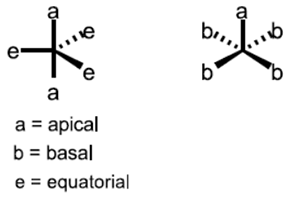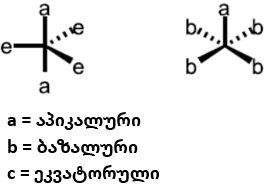ქიმიის ტერმინთა განმარტებითი ლექსიკონი
- ინგლისურ-ქართული
- ქართულ-ინგლისური
- ლექსიკონის შესახებ
- გამოხმაურება

| apical (basal, equatorial) | აპიკალური (ბაზალური, ეკვატორული) |
| In trigonal bipyramidal structures (e.g. a five-coordinate trigonal bipyramid with phosphorus as central atom) the term apical refers to the two positions that are collinear with the central atom or to the bonds linking these positions to the central atom. The three equivalent bonds (or positions) in a plane passing through the central atom and perpendicular to the direction of the apical bonds are described as equatorial. (See axial, equatorial for alternative use). The term apical is also used for the bond pointing from the atom at or near the centre of the base to the apex of a pyramidal structure. The positions at or near the base of the pyramid, or the bonds linking those positions to the central atom of the base are described as basal. The apical bonds have also been called axial.
|
ტრიგონალურ ბიპირამიდულ სტრუქტურებში (მაგ. ხუთკოორდინაციული ტრიგონალური ბიპირამიდა, რომელშიც ცენტრალურ ატომს ფოსფორი წარმოადგენს) ტერმინი აპიკალური აღნიშნავს ორ პოზიციას, რომლებიც კოლინეარულია ცენტრალურ ატომთან ან ბმებთან, რომლებიც ამ პოზიციებს ცენტრალურ ატომთან აკავშირებს. სამი ეკვივალენტური ბმა (ან პოზიცია) სიბრტყეში, რომელიც გადის ცენტრალურ ატომზე და აპიკალური ბმების მიმართულების პერპენდიკულარულია, სახელდება, როგორც ეკვატორული (იხ. ღერძული, ეკვატორული ალტერნატიული გამოყენებისთვის). ტერმინი აპიკალური ასევე გამოიყენება კავშირისთვის, რომელიც მიმართულია ატომიდან ფუძის ცენტრისკენ ან მის მახლობლად პირამიდული სტრუქტურის წვერისაკენ. პოზიციები პირამიდის ფუძესთან ან მის მახლობლად, ან ბმები, რომლებიც აკავშირებს ამ პოზიციებს ფუძის ცენტრალურ ატომთან, სახელდება, როგორც ბაზალური. აპიკალურ ბმებს ასევე ღერძულსაც უწოდებენ.
|
| Source | წყარო: PAC, 1996, 68, 2193 (Basic terminology of stereochemistry (IUPAC Recommendations 1996)) on page 2199 |
|










